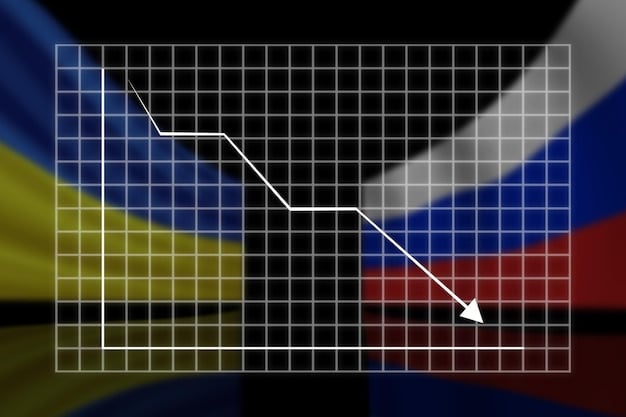Reality TV Shakeup: Network Cancels 3 Shows Amidst Declining Ratings – Full List Revealed

A major reality TV shakeup has occurred as a prominent network cancels three of its shows due to declining ratings, signaling a significant shift in viewer preferences and network strategy, with the full list of affected shows now revealed.
The world of reality television is in turmoil as networks grapple with shifting viewer habits and plummeting ratings. In a sudden reality TV shakeup: network cancels 3 shows amidst declining ratings, full list revealed, sending shockwaves through the industry and leaving fans stunned.
Reality TV Landscape Faces Major Changes
The recent cancellations reflect a broader trend of declining viewership for traditional reality TV formats. Networks are now under pressure to innovate and adapt to the changing tastes of audiences who are increasingly turning to streaming services and online content.
These cancellations may signal a shift in the types of reality TV shows that will dominate the airwaves in the future. Networks may be looking for more authentic, less contrived formats, or for shows that tackle more relevant and socially conscious themes.

The Numbers Don’t Lie: Declining Ratings
One of the primary factors behind the cancellations is the undeniable decline in ratings for many reality TV shows. In an era of endless entertainment options, viewers are becoming more selective about how they spend their time.
Shows that once drew millions of viewers are now struggling to maintain a fraction of their former audience. This decline has a direct impact on advertising revenue, making it difficult for networks to justify the cost of producing these shows.
- Shifting Viewer Habits: The rise of streaming services and online content has fragmented the audience, making it harder for traditional TV shows to compete.
- Content Saturation: The sheer volume of reality TV shows available has led to viewer fatigue and a desire for something new and different.
- Changing Tastes: Audiences are becoming more discerning and are demanding more authentic and engaging content.
Ultimately, the cancellations reflect a harsh reality: in the competitive world of television, only the strongest and most relevant shows survive. Networks are being forced to make tough decisions in order to stay afloat.
The Chopping Block: Which Shows Got the Axe?
The big question on everyone’s mind is: which shows were cancelled? The list includes some surprising names, as well as some that many industry insiders saw coming.
The cancellations highlight the cutthroat nature of the television industry, where even established shows can be vulnerable to the whims of the audience and the pressures of the bottom line.
The Unfortunate Trio: A Closer Look at the Cancelled Shows
While the network hasn’t issued an official statement detailing the specific reasons for each cancellation, some common threads emerge. Poor ratings, high production costs, and a lack of social media buzz all likely played a role.
- “Backstage Pass”: A behind-the-scenes look at aspiring musicians struggling to break into the industry. Despite its initial appeal, the show failed to attract a consistent audience.
- “Rivals Reunited”: A competition show that pitted former rivals against each other in a series of challenges. The show was criticized for being overly contrived and lacking genuine emotional connection.
- “House Flippers”: A reality show that followed real estate investors as they renovated and flipped houses. The show’s formulaic approach and lack of originality ultimately led to its demise.
The fate of these shows serves as a cautionary tale for other reality TV programs. In order to survive in the current landscape, shows must be innovative, engaging, and relevant to the needs and desires of their audience.
Behind the Scenes: Reasons for the Network’s Decision
The decision to cancel three shows is a significant one, and it’s likely that it was not made lightly. Several factors likely contributed to the network’s decision, including financial considerations, programming strategy, and changing audience tastes.
The network’s actions reflect a broader trend in the industry, as media companies are increasingly focused on streaming services and original content. Traditional TV networks are facing increased competition and are under pressure to cut costs and improve their bottom line.

Financial Pressures: The Cost of Doing Business
One of the biggest drivers behind the cancellations is the financial pressure facing traditional TV networks. Advertising revenue is down, production costs are up, and competition from streaming services is fierce.
Cancelling underperforming shows is one way for networks to cut costs and free up resources for new projects that have a better chance of success. In some cases, it may simply be more cost-effective to invest in original programming for streaming platforms rather than trying to salvage struggling TV shows.
The network’s decision may also be influenced by its overall financial outlook. If the company is facing financial difficulties, it may be forced to make tough choices in order to stay afloat.
Future of Reality TV: What’s Next for Networks?
The cancellations raise important questions about the future of reality television. Will the genre continue to decline, or can it adapt and evolve to meet the changing needs of audiences? What types of shows will be successful in the years to come?
The reality TV landscape is constantly evolving, and networks are facing a number of challenges. In order to survive, they must be willing to experiment with new formats, embrace new technologies, and listen to the needs and desires of their audience.
Innovation or Extinction: Adapting to Changing Tastes
One of the keys to the future of reality television is innovation. Networks must be willing to move beyond traditional formats and experiment with new concepts and approaches.
Some possible directions for the genre include more authentic and unscripted shows, shows that tackle important social issues, and shows that incorporate interactive elements and social media integration.
- Embracing Authenticity: Viewers are increasingly drawn to reality TV shows that feel genuine and relatable. Shows that focus on real people and their experiences, rather than contrived drama, may be more successful.
- Tackling Social Issues: Reality TV can be a powerful platform for raising awareness about important social issues and promoting positive change. Shows that address topics like mental health, diversity, and environmental sustainability may resonate with viewers.
- Interactive Elements: Incorporating interactive elements and social media integration can enhance viewer engagement and create a more immersive experience. Shows that allow viewers to vote, comment, and participate in the storyline may be more successful.
Ultimately, the future of reality television will depend on the ability of networks to adapt and innovate. Those who are willing to embrace change and break new ground may be able to revive the genre and attract a new generation of viewers.
Viewer Reactions: Social Media Explodes
News of the cancellations spread quickly on social media, sparking a flurry of reactions from viewers. Some fans expressed disappointment and sadness, while others celebrated the demise of shows they considered to be stale or inauthentic.
The social media response highlights the passionate and engaged nature of reality TV audiences. Viewers have strong opinions about the shows they watch and are quick to share their thoughts and feelings online.
Twitter Storms: The Good, the Bad, and the Ugly
Twitter was particularly active in the wake of the cancellations, with hashtags related to the shows trending for hours. Some viewers expressed outrage, while others welcomed the news.
- Devoted Fans: Many fans expressed their love for the cancelled shows and their disappointment at not being able to see more episodes.
- Critical Viewers: Others criticized the shows for being formulaic, contrived, or simply not entertaining enough.
- Industry Observers: Industry insiders weighed in on the cancellations, offering their analysis of the reasons behind the decisions and what they might mean for the future of reality TV.
The social media response underscores the importance of online engagement for reality TV shows. Shows that can generate buzz and create a strong online community are more likely to succeed in the long run.
New Horizons: Promising Reality TV Concepts on the Horizon
Despite the recent cancellations, the reality TV genre is far from dead. There are still plenty of innovative and exciting concepts in development that could revitalize the industry and attract new viewers. Networks are actively searching for the next big hit, and several promising shows are on the horizon.
The future of reality television lies in its ability to adapt, innovate, and connect with audiences on a deeper level. Shows that can offer something new and different, while also staying true to the core values of the genre, have the best chance of success.
The Next Big Thing: Glimmers of Hope in Development
The development pipeline is filled with promising new concepts that could redefine the reality TV landscape. From innovative competition formats to documentaries focused on important social issues, there is no shortage of ideas being explored.
As networks search for the next big thing, they are increasingly looking for shows that can resonate with viewers on a personal level. Authenticity, relatability, and social impact are all key factors that could determine the success of future reality TV programs.
The future of reality TV is uncertain, but one thing is clear: the genre is at a crossroads. Networks must be willing to take risks, experiment with new formats, and listen to the needs and desires of their audience. Those who can do so successfully may be able to revive the genre and attract a new generation of viewers.
| Key Point | Brief Description |
|---|---|
| 📉 Ratings Decline | Shows faced significant viewership drops. |
| 🎬 Show Cancellations | Three reality TV programs were canceled by the network. |
| 💰 Financial Impact | Network aims to cut costs amid declining ad revenue. |
| 🔮 Future Trends | Industry seeks more authentic, innovative content. |
What Led to the Reality TV Shakeup?
▼
The main reasons cited were declining viewership numbers and the need for the network to cut costs. These shows likely didn’t attract enough viewers to justify their production expenses.
▼
The three reality TV shows that were canceled were “Backstage Pass,” “Rivals Reunited,” and “House Flippers,” each facing its own set of challenges in viewership.
▼
Viewer reactions are mixed, with some expressing sadness and disappointment over their favorite shows ending, and others viewing it as an opportunity for fresh content.
▼
This move suggests a shift towards seeking more innovative and cost-effective reality TV programs, possibly with more interactive and socially relevant themes.
▼
New concepts include more authentic unscripted shows, those addressing serious social issues, and programs that incorporate interactive elements to gain viewer participation.
Conclusion
The reality TV shakeup at the network highlights the dynamic and ever-changing nature of the entertainment industry. While the cancellation of these three shows may disappoint some viewers, it also opens up opportunities for new and innovative programming that can better capture the attention of audiences in the years to come. As networks navigate the challenges of declining ratings and changing viewer habits, the future of reality TV is sure to be filled with both challenges and exciting possibilities.





